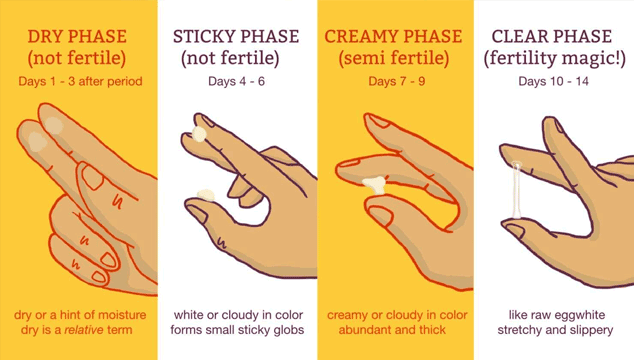![]() The information provided by our expert should not constitute a diagnosis of your condition. Always consult a medical practitioner or healthcare provider for a formal diagnosis. By making use of this content, you agree that ConceiveEasy and the expert assume no liability.
The information provided by our expert should not constitute a diagnosis of your condition. Always consult a medical practitioner or healthcare provider for a formal diagnosis. By making use of this content, you agree that ConceiveEasy and the expert assume no liability.
When you’re trying to get pregnant, cervical mucus is very important. You learn what optimal egg-white cervical mucus (EWCM) looks like, so you know when you are ovulating, you learn all about cervical mucus and how it relates to conception. However, you might not be too familiar with how cervical mucus changes once you are pregnant to be an early indicator of pregnancy. Claim Your 20 Free Pregnancy Tests – Click Here

What Is Cervical Mucus?
Cervical mucus is a fluid that is produced by the cervix, and the consistency of it changes throughout your menstrual cycle based on hormones that are associated with ovulation. Its consistency continues to change once a woman gets pregnant.
Usually a woman becomes acquainted with her cervical mucus and its changes throughout her cycle while she is trying to conceive. That is because in order to get pregnant, you have to know when you are ovulating, to time intercourse – and spotting egg-white fertile-quality cervical mucus will help you pinpoint the day. (More on that below!)


Cervical Mucus Changes During Pregnancy
Mucus changes during pregnancy
You do need to know that your cervical mucus will change when you become pregnant. The cervical mucus during pregnancy becomes very much more slippery than usual. You will no longer see the egg white cervical mucus that you might have become used to.
Did you know? —> As your pregnancy progresses, your cervical mucus will actually turn into your mucus plug.
As your pregnancy progresses, your cervical mucus will then almost completely dry up. This is completely normal as well, and should not be a cause for concern. Of course, if you have a question or concern about your cervical mucus, just talk to your doctor.
Early pregnancy characteristics
Cervical mucus in early pregnancy is typically white, creamy, and odorless. It is normal to see increasing cervical mucus levels during the beginning of pregnancy, even so much so that it might cause a wetness in the underwear.
Don’t be alarmed or surprised if you notice a bit of pink or brown blood mixed in with the cervical mucus during very early pregnancy.
Cervical mucus will usually turn to a completely white color by week six or so of pregnancy. The reason for the increased cervical mucus in early pregnancy is due to the increased blood flow to the vagina.
Cervical changes
Once you become pregnant, the cervix begins to move down into a lower position. This position is much lower than what you are used to if you do have experience checking your cervix manually.If you are used to checking your cervix, you will also know that the cervix will become softer during pregnancy. It may even seem like the cervix becomes disconnected, it drops so far down and becomes so soft.You might not notice these changes at all, unless you are already used to checking your cervix by yourself. If you have experience in that area, then you will be able to notice these cervical changes.

Cervical Mucus While Trying to Get Pregnant
Whenever a woman is trying to get pregnant, she probably has been told to purchase a body basal thermometer and start taking temperatures first thing in the morning before doing anything. This way, if there is a spike in the temperature, it is a sure sign that ovulation has happened.
This is a good method to try while you are learning about your cycle before actually trying to conceive. Because, once ovulation occurs and there is a spike in the temperature that indicates it, it is probably too late in the cycle for conception to happen considering the egg is good from 12-24 hours before it starts to disintegrate.
However, in order for a woman to know when ovulation is on its way before she starts purchasing ovulation prediction kits which will cost more money, she needs to begin to get to know the consistency of her cervical mucus throughout her cycle. That will be a strong indicator of how fertile she is, and she will know when the best time is to start trying to get pregnant.


Cervical Mucus Changes During Your Cycle
As soon as menstruation is complete, there will be very little cervical mucus. It will be scant and dry because ovulation is nowhere near happening right after a period is complete. However, as the cycle progresses, there will be a little more mucus and while a follicle is growing which contains the egg that will be released during ovulation, you are still not quite at a fertile point in your cycle.

After a few days after the end of your menstrual period, you will notice that the mucus is sticky and will have a cloudy appearance, or it could be white or yellow.
The closer you are to ovulation, the thicker the mucus will become.
In fact about 2-3 days before you ovulate, the mucus will become abundant to the point that it will have a consistency of raw egg whites. You can stretch it between your fingers, as it is very slippery. The reason your mucus is so slippery is due to the fact that it helps the sperm move along towards the egg.
So on average, you will have about 4 slippery days until you end up with less mucus that is sticky and cloudy again. That is a sure sign that ovulation has happened, and pregnancy will not happen during that particular cycle if it hasn’t been achieved during the fertile days. And about 3-4 days before your period, you will end up extremely dry again.
To sum up, this is how cervical mucus changes throughout your menstrual cycle:
• Period ends = scant and dry
• Up to few days after period ends = sticky and cloudy
• 2-3 days before ovulation = abundant, stretchy, and • resembling raw egg whites
• After ovulation = sticky and cloudy
• 3-4 days before period = scant and dry
How To Check Your Cervical Mucus
In order to monitor your cycle by using this method, you have to check the consistency of the mucus each day of your cycle which includes right after you have your period when you are the least fertile.
There are three ways to check for the mucus.
- The first way is to wipe your vagina before peeing with white toilet paper. Look at the color and feel the mucus.
- The second way to check for the mucus is to examine your underwear and notice if there is any kind of leakage. Especially if you suspect you are on your way to ovulation based on the length of your cycle (for instance if you know you are ready to ovulate around 2 weeks into your cycle).
- The third and most accurate way to check is to clean your fingers and to insert two into your vagina and then check the color and consistency.

Is it scant and is there no color? That happens right after you have your period when you are least likely to get pregnant.
Is it sticky and has a cloudy appearance? Are you about a week into your cycle (depending on your cycle length but let’s assume you have a 28-30 day cycle)? You are still are still not at a fertile point but the changes in consistency is a sign that your egg is ripening.
Is it like raw egg whites and is there a lot of it? If you are about 10 days to 2 weeks into your cycle and noticing that your mucus looks and feels like raw egg whites, and that there is a lot of it, then you are ready to ovulate! So if you are trying to get pregnant, this is the time to make that attempt.
Is it sticky and cloudy after being slippery? If you had slippery mucus the other day and noticed that the mucus is now sticky and cloudy then ovulation already occurred. If pregnancy did not happen during this cycle, then rinse and repeat for the next one.
While you are using this method, in conjunction with taking your basal temperature each morning, and for reassurance you decided to invest in ovulation prediction kits, you will clearly without a doubt know that you are ovulating.

Cervical Mucus When Trying to Get Pregnant
So to sum up, cervical mucus has an incredible importance when trying to get pregnant. It is the life-breathing cervical mucus that brings the sperm and egg together. Knowing what fertile quality cervical mucus looks like and feels like will help you achieve your dreams of conception quicker and easier.
And once a woman becomes pregnant, that same cervical mucus now becomes the mucus plus to hold everything tight and steady while that new life is baking inside.

Lack of Cervical Mucus Changes
If you are noticing that there are no changes in your cervical mucus, then you are not ovulating properly. Especially if your cycles are quite irregular by weeks or even a month.
If your mucus is always scant and dry or at the most is cloudy and sticky but never reaches that egg-white appearance and feeling, then ovulation is not happening.

This is also useful for you to know. Especially if you have been trying to conceive for months and nothing has happened. A lack of changes in mucus is a clear sign that ovulation is not happening

How to Increase CM & Stimulate Ovulation
If that is the case, then you will need assistance to help stimulate ovulation. Many over the counter herbs, supplements and prescription fertility drugs exist that help to induce ovulation as well as to increase fertile cervical mucus.
• Clomid
• ConceiveEasy
• Evening Primrose Oil
You could start by taking a fertility herb like Evening Primrose Oil, which can help to increase your egg-white cervical mucus. Likewise, you could start with an all-natural fertility supplement like ConceiveEasy, which can help to both naturally stimulate ovulation as well as to increase fertile cervical mucus. If these don’t work, you make need to get the big guns and go to the doctor to get prescribed Clomid, which helps regulate ovulation especially in patients that have polycystic ovarian syndrome (PCOS) where testosterone levels are too high in a woman, which in turn impedes ovulation.
Other issues that can affect the cervical mucus consistency includes breastfeeding, going through early menopause, cervical surgery, douching, using hormonal birth control, vaginitis, and some sexually transmitted infections or diseases.











Comments